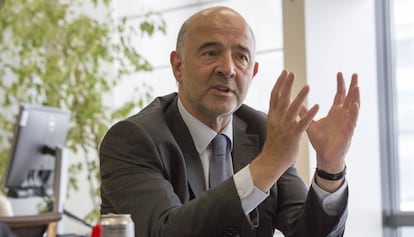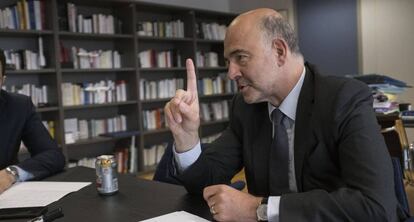Pierre Moscovici: “Spain is not Italy: it complies with the rules”
The EU finance commissioner talks about the need for more economic reforms and the danger posed by illiberal forces as Europe faces elections next year

Pierre Moscovici, the European Commissioner for Economic and Financial Affairs, talked to EL PAÍS inside his office ahead of his trip to Spain, where he will meet with Prime Minister Pedro Sánchez and Economy Minister Nadia Calviño.
The commissioner said he is ready to offer Madrid some leeway with regard to its deficit targets, citing Spain’s strong post-crisis progress and respect for the rules. He denied that this could have a ripple effect on countries such as Italy, where a populist government has said it also wants room to increase the budget deficit.
Reforms need to be reconciled with progress
Moscovici also admitted that he is considering a bid for the European Commission presidency when the EU holds elections next year. One of Europe’s biggest challenges, he says, will be to fight off the anti-democratic and illiberal forces gaining ground across the continent.
Question. Are you afraid that the Spanish government’s difficulty getting the budget plan passed will lead to new elections or a period of instability in the euro zone?
Answer. I know that the government is in a parliamentary minority, but I hope that Spain’s political forces will understand that it is in the national interest to have a budget. I said the same thing to the previous executive. I am not going to debate on any possible elections. After years of crisis, difficulties and unpopular decisions, Spain is on its way to emerging this year from the Excessive Deficit Procedure. And that’s good news for the citizens, for the country and for the euro zone, because it means ending another legacy of the crisis. It doesn’t mean that all problems have been solved. Spain is still suffering from high unemployment. But once Spain’s public deficit comes below 3% of GDP, it will be in a new situation, with a more stable economy in the heart of the euro zone. I want to ask PM Sánchez and Minister Calviño to keep meeting Spain’s commitments and not to repeat mistakes of the past.

Q. What are the challenges now?
A. Spain must keep reducing its deficit through structural efforts, and also reduce its public debt, which stands at 97% of GDP. I know it is not easy, but there are examples in Europe that show that it is possible to reduce the structural deficit (which is adjusted for the economic cycle) and debt while still creating wealth and jobs. For next year, the EU Council’s recommendation is a structural adjustment of 0.65% of GDP. This is significant, but still below the 1% that could be asked. But the Commission considers that Spain is still suffering from the legacy of the crisis, and it still has a lot of unemployment.
Q. Do you think that the leeway granted to Spain on the deficit could set a precedent for Italy?
The danger from populists, nationalists, anti-democratic and illiberal forces is very significant
A. We will soon start talks with Italy about the 2019 budget plan, as we will do with Spain. I have read statements in the press, but I will not respond to provocations. The Commission is not at the origin of Italy’s problems. If I keep asking for Italy to carry on with fiscal consolidation, it’s because it has a huge public debt of 130%, which hinders the country’s ability to invest to benefit citizens and increase investor trust. Fiscal consolidation does not mean austerity, it means improving spending policies, eliminating inefficiencies, and improving infrastructure, capacity and productivity, which is the key problem in Italy.
Q. Are you afraid of a contagion?
A. I know the talks with Italy will be delicate. There is a populist government there and some ministers and political leaders who will try to challenge the euro zone. This is not the case with Spain. They cannot be compared. Maybe Spain will have problems coming up with a budget, but it has a pro-European government that complies with the rules and which is reducing the deficit.
Q. You said there was a “window of opportunity” to reinforce the euro zone after the French and German elections. Did that window close after the Italian elections?
Spain must keep reducing its deficit through structural efforts and also reduce its public debt
A. It is more narrow, but it is still open. I have spoken with the president of the Eurogroup and together with the Commission we want to work toward an agreement in December. We don’t feel that the possibility to improve governance and the ability to conduct policy in the euro zone is over. The process is not dead. It is alive. And we’re going to devote a lot of energy to getting something concrete this year, since next year we’ll be entering an election period.
Q. In your job as commissioner, you have been critical of the Eurogroup for the lack of transparency, and also about the Greek bailout. Do you feel that European institutions have played a role in the rise of populism during the crisis?
A. I don’t believe that European institutions are responsible, but I do believe that there is a political context and new social demands. And one cannot respond to illiberal and anti-democratic movements without a response from the democrats. That is why I support greater democratic governance of the eurozone. I do not regret what we did in Greece. I think we were on the right side of history: we fought a Grexit. And people know the difference between a French social-democrat and a German conservative. Of course we made mistakes, because we were facing a crisis that we could not anticipate and it led to hard times. But in the end, in the case of Greece, it was a win-win situation. The eurozone won and the country won, because it left behind false public accounts and an artificial economy.
Q. You talk about fighting inequality as one of your priorities, but in southern Europe people perceive reforms as the cause of that gap.
A. I disagree. There seems to be a contradiction in being a social-democrat and favoring reforms. But there are many types of reform. Reforms need to be reconciled with progress. If the labor market does not work, it needs to be reformed or nobody will join it. If pensions are unsustainable, they will have to be reformed so the system does not collapse. But once these necessary reforms are done, we need to concentrate on other post-crisis reforms focused on investment, redistribution, education. The time has come to move towards Reforms 2.0.
Q. How do you see the 2019 EU elections?
A. There is a historical and existential challenge to the EU’s current identity. The danger from populists, nationalists, anti-democratic and illiberal forces is very significant. They don’t want to change the laws, they want to destroy them. These elections will be key to fight those ideas that want to destroy the EU’s identity. Pro-Europeans must formulate proposals. And to me, the challenges are reducing inequality and fighting rejection of immigrants.
Q. Will you be a candidate to the Commission presidency?
A. I haven’t decided yet. I am a commissioner and I am very committed to my work, and to things like the fight against social and economic inequality and the digital tax. My first political goal is to give citizens the desire to vote for Europe in May 2019. I don’t want a populist future in Europe.
English version by Susana Urra.
Tu suscripción se está usando en otro dispositivo
¿Quieres añadir otro usuario a tu suscripción?
Si continúas leyendo en este dispositivo, no se podrá leer en el otro.
FlechaTu suscripción se está usando en otro dispositivo y solo puedes acceder a EL PAÍS desde un dispositivo a la vez.
Si quieres compartir tu cuenta, cambia tu suscripción a la modalidad Premium, así podrás añadir otro usuario. Cada uno accederá con su propia cuenta de email, lo que os permitirá personalizar vuestra experiencia en EL PAÍS.
¿Tienes una suscripción de empresa? Accede aquí para contratar más cuentas.
En el caso de no saber quién está usando tu cuenta, te recomendamos cambiar tu contraseña aquí.
Si decides continuar compartiendo tu cuenta, este mensaje se mostrará en tu dispositivo y en el de la otra persona que está usando tu cuenta de forma indefinida, afectando a tu experiencia de lectura. Puedes consultar aquí los términos y condiciones de la suscripción digital.








































